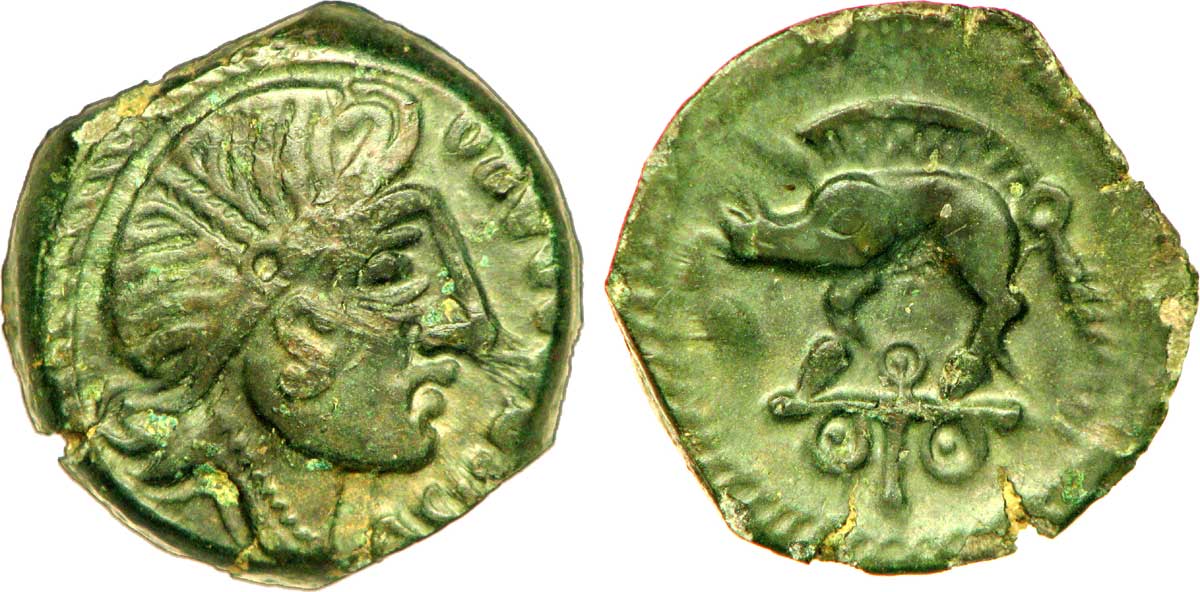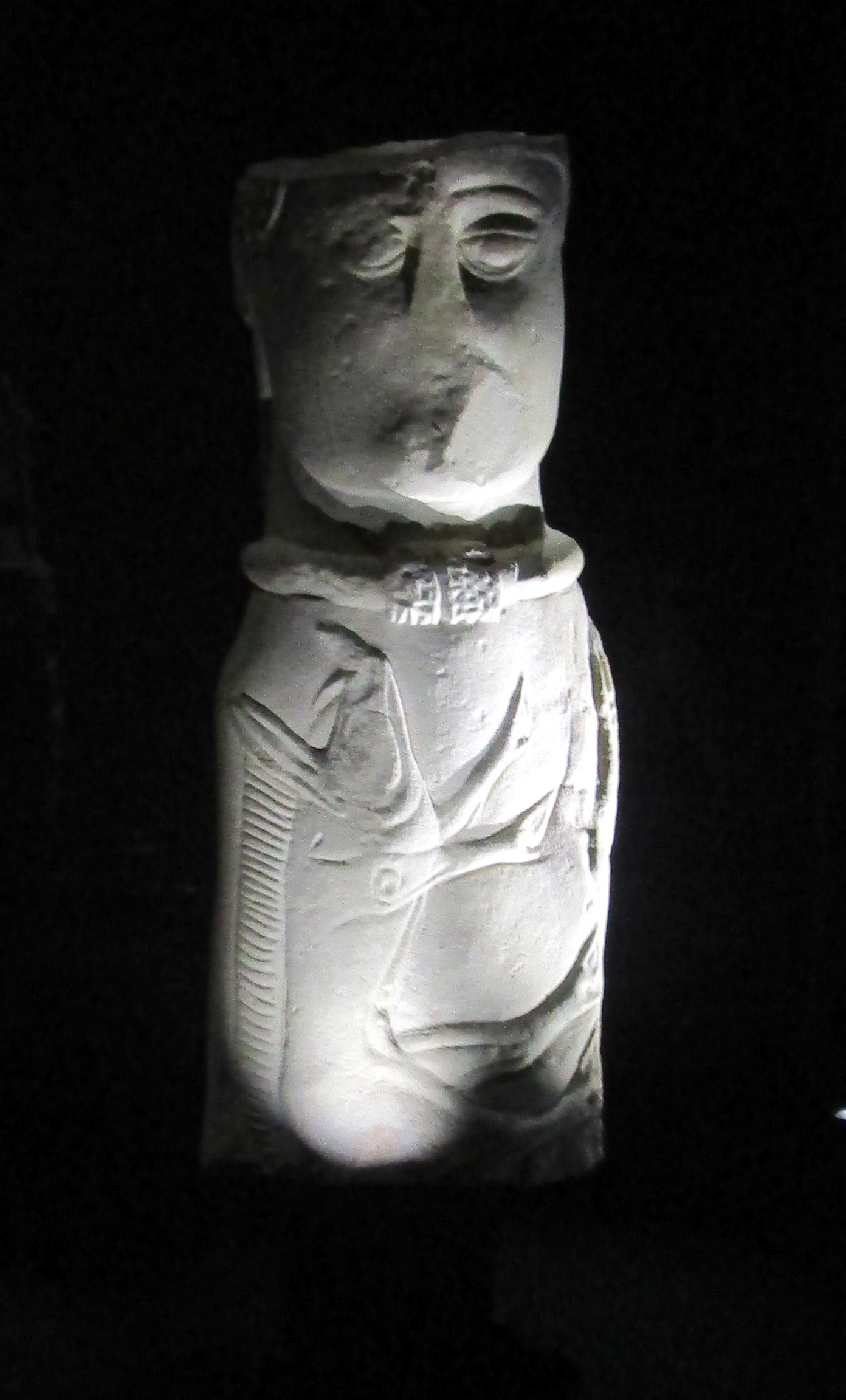Moccus on:
[Wikipedia]
[Google]
[Amazon]
 Moccus is a
Moccus is a
 Scholars such as Émile Thévenot and Philippe Jouët have connected Moccus with the god of
Scholars such as Émile Thévenot and Philippe Jouët have connected Moccus with the god of
 Miranda Green considers the boar in Celtic religious contexts to represent both "war, because of their ferocity and indominability", and "prosperity, because pork was a favourite Celtic food and played an important part in feasting". Celtic warriors sported boar motifs on their helmets, standards, and
Miranda Green considers the boar in Celtic religious contexts to represent both "war, because of their ferocity and indominability", and "prosperity, because pork was a favourite Celtic food and played an important part in feasting". Celtic warriors sported boar motifs on their helmets, standards, and
 Moccus is a
Moccus is a Celtic god
The gods and goddesses of the pre-Christian Celtic peoples are known from a variety of sources, including ancient places of worship, statues, engravings, cult objects and place or personal names. The ancient Celts appear to have had a pantheon ...
who is identified with Mercury
Mercury commonly refers to:
* Mercury (planet), the nearest planet to the Sun
* Mercury (element), a metallic chemical element with the symbol Hg
* Mercury (mythology), a Roman god
Mercury or The Mercury may also refer to:
Companies
* Merc ...
. He is the boar- or swine-god of the continental Celtic tribe of Lingones
The Lingones (Gaulish: 'the jumpers') were a Gallic tribe of the Iron Age and Roman periods. They dwelled in the region surrounding the present-day city of Langres, between the provinces of Gallia Lugdunensis and Gallia Belgica.
Name
Attes ...
. Moccus was invoked as the protector of boar hunters and warriors. Boar meat was sacred among the ancient Celts, and features in accounts of feasts in Irish mythology
Irish mythology is the body of myths native to the island of Ireland. It was originally passed down orally in the prehistoric era, being part of ancient Celtic religion. Many myths were later written down in the early medieval era by C ...
. The Lingones, whose tribal center was at modern-day Langres
Langres () is a commune in France, commune in northeastern France. It is a Subprefectures in France, subprefecture of the Departments of France, department of Haute-Marne, in the Regions of France, region of Grand Est.
History
As the capital o ...
, were a Gaulish tribe located in the area of the rivers Seine and Marne in what is now northeastern France. They were neighbors to the Celto-Germanic tribe of Treveri
The Trēverī (Gaulish: *''Trēueroi'') were a Celtic tribe of the Belgae group who inhabited the lower valley of the Moselle from around 150 BCE, if not earlier, until their displacement by the Franks. Their domain lay within the southern fringe ...
. Another tribe known as Lingones was located near the mouth of the Po River in northeastern Italy, and were known for agriculture, weaving and metalworking.
There was a dedicated feast day to Moccus. He had a following in the Romano-Celtic period.
Historical attestation
The theonym Moccus is known from a single votive inscription from Langres, which reads as follows: The name is derived from theGaulish
Gaulish was an ancient Celtic languages, Celtic language spoken in parts of Continental Europe before and during the period of the Roman Empire. In the narrow sense, Gaulish was the language of the Celts of Gaul (now France, Luxembourg, Belgium ...
''moccos'' 'pig' or 'wild boar', cognate with Old Irish ''mucc'', Welsh ''moch'', and Breton ''moc'h'', all with similar meanings. The same root also appears in the personal names of a number of individuals in Gaul in such forms as ''Moccius'', ''Moccia'', ''Mocconius'', ''Catomocus'', etc.
 Scholars such as Émile Thévenot and Philippe Jouët have connected Moccus with the god of
Scholars such as Émile Thévenot and Philippe Jouët have connected Moccus with the god of Euffigneix
Euffigneix () is a commune in the Haute-Marne department in north-eastern France.
See also
*Communes of the Haute-Marne department
The following is a list of the 426 communes in the French department of Haute-Marne.
The communes cooperate in ...
, a Celtic sculpture depicting a torc
A torc, also spelled torq or torque, is a large rigid or stiff neck ring in metal, made either as a single piece or from strands twisted together. The great majority are open at the front, although some had hook and ring closures and a few had ...
-wearing god with a wild boar vertically over his torso. Thévenot points out that Euffigneix would have lain in the same tribal territory—that of the Lingones
The Lingones (Gaulish: 'the jumpers') were a Gallic tribe of the Iron Age and Roman periods. They dwelled in the region surrounding the present-day city of Langres, between the provinces of Gallia Lugdunensis and Gallia Belgica.
Name
Attes ...
—as did Langres, where the Moccus inscription was found.
In ''The Religion of the Ancient Celts'' (1911), J. A. MacCulloch noted that "the swine was a frequent representative of the barleycorn-spirit or of vegetation divinities in Europe" and that "the flesh of the animal was often mixed with the seed corn or buried in the fields to promote fertility". MacCulloch speculates that it was Moccus' role as a fertility god that led to his being identified with Mercury
Mercury commonly refers to:
* Mercury (planet), the nearest planet to the Sun
* Mercury (element), a metallic chemical element with the symbol Hg
* Mercury (mythology), a Roman god
Mercury or The Mercury may also refer to:
Companies
* Merc ...
, whose Greek equivalent Hermes was associated with "fertility in flocks and herds".
Jouët connects Moccus with the Irish myth in '' Oidheadh Chlainne Tuireann'', in which Lugh
Lugh or Lug (; ga, label=Modern Irish, Lú ) is a figure in Irish mythology. A member of the Tuatha Dé Danann, a group of supernatural beings, Lugh is portrayed as a warrior, a king, a master craftsman and a savior.Olmsted, Garrett. ''The God ...
obtains the pig-skin of Tuis, which could heal any injury. Lugh is widely considered to be the Irish form of the Celtic god Lugus
Lugus was a deity of the Celtic pantheon. His name is rarely directly attested in inscriptions, but his importance can be inferred from place names and ethnonyms, and his nature and attributes are deduced from the distinctive iconography of Gall ...
, an analogue of the Gaulish Mercury.
The pig in ancient Celtic religion
MacCulloch highlights the high status and prestige enjoyed by pigs or boars in Celtic cultures, including in religious and mythological contexts: Miranda Green considers the boar in Celtic religious contexts to represent both "war, because of their ferocity and indominability", and "prosperity, because pork was a favourite Celtic food and played an important part in feasting". Celtic warriors sported boar motifs on their helmets, standards, and
Miranda Green considers the boar in Celtic religious contexts to represent both "war, because of their ferocity and indominability", and "prosperity, because pork was a favourite Celtic food and played an important part in feasting". Celtic warriors sported boar motifs on their helmets, standards, and carnyx
The ancient carnyx was a wind instrument of the Iron Age Celts, used between c. 200 BC and c. AD 200. It was a type of bronze trumpet with an elongated S shape, held so that the long straight central portion was vertical and the short mouthpiec ...
es.
Modern worship
Moccus is worshipped in modern times by groups of Druids, Wiccans and Celtic polytheists. He is one of the main temple gods worshiped by members of the Shrine of the Irish Oak, who have assigned his feast day to the winter solstice due to his aspects as a protector, sun god, and giver of plenty.References
See also
* * * * * Gaulish gods Hunting gods Animal gods Mythological pigs Wild boars Mercurian deities {{Celt-myth-stub